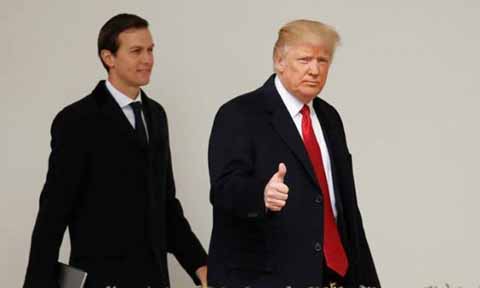
A White House in crisis scrambled to allay public concern over reports that Donald Trump’s son-in-law sought a secret communications link to Russia-a bombshell allegation the US president swatted down as “fabricated.”
After returning late Saturday from his first foreign trip as president, Trump geared up to combat concerns over his advisers’ ties to Russia, including explosive reports about Jared Kushner, his indispensable aide-de-camp.
Trump was meeting with attorneys at the White House on Sunday, presumably over the latest development in the long-running Russia intelligence saga, news reports said.
US media said the White House is creating a new rapid-fire communications unit to respond to the controversy, led by Kushner, senior presidential adviser Steve Bannon and White House Chief of Staff Reince Priebus.
Trump, who had been uncharacteristically quiet on Twitter during his nine-day trip abroad, resumed his favorite past-time with fury on Sunday, dismissing allegations of Russia ties as “fake news” and “fabricated lies.”
“It is my opinion that many of the leaks coming out of the White House are fabricated lies made up by the #FakeNews media,” he wrote.
“Whenever you see the words ‘sources say’ in the fake news media, and they don’t mention names it is very possible that those sources don’t exsist but are made up by fake news writers. #FakeNews is the enemy!” the US leader wrote, spelling errors and all.
The administration had hoped Trump’s nine-day turn in the international spotlight would offer a respite from relentless coverage-marked by an endless barrage of explosive revelations-of an ever-widening probe into Russian meddling in last year’s election and possible collusion by the Trump campaign.
However, the eve of his return brought the biggest story to date: A Washington Post report about Kushner’s alleged proposal to the Russians to create a secret channel out of the reach of US spymasters.
The talks between Kushner and the Russians, if confirmed, would raise new questions about the Trump team’s relationship with Moscow, which US intelligence agencies say tried to sway the November election in Trump’s favor.
Meanwhile, a parade of senior administration officials tried to downplay the story, saying it was not all that unusual to establish “back-channel” ties with a foreign government.
Trump’s National Security Advisor H.R. McMaster refused to talk about the allegations, but said that generally speaking, “we have back-channel communication with a number of countries… I would not be concerned about it.”
His comments were echoed by Homeland Security Secretary John Kelly.
“It’s both normal in my opinion and acceptable,” he told ABC News on Sunday.
“Any way that you can communicate with people, particularly organizations that are maybe not particularly friendly to us, is a good thing and, again, it comes back to whatever the communication is, comes back into the government and shared across the government so it’s not a bad thing to have multiple communication lines to any government,” he said.
But the top Democrat on the House Intelligence Committee, which is investigating the Russian election meddling, was dubious about those assertions.
“You have to ask, well, who are they hiding the conversations from?” Representative Adam Schiff said in an interview with ABC News.

